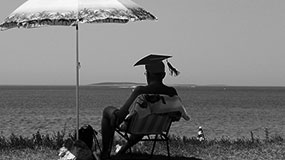
 Ever wonder what happens at Trent during the summer? You might think that with most of the students gone the university shuts its doors and the staff head for hills, or at least their cottages. But you’d be wrong. “It may appear on the surface that it’s quiet in the summertime, but it isn’t,” said President Steven Franklin when he met with Arthur last week to talk about Trent’s summer activities.
Ever wonder what happens at Trent during the summer? You might think that with most of the students gone the university shuts its doors and the staff head for hills, or at least their cottages. But you’d be wrong. “It may appear on the surface that it’s quiet in the summertime, but it isn’t,” said President Steven Franklin when he met with Arthur last week to talk about Trent’s summer activities.
Joining Franklin were VP of Administration Steven Pillar, VP Academic Provost Gary Boire, TCSA President Brea Hutchinson and VP of Student Issues Tessa Nasca.
With fewer students enrolled in classes, the university administration uses the opportunity to prepare for the fall and winter terms, and to offer the facilities to the community.
“There’s a lot of maintenance, capital refurbishment, a lot of work on facilities… that is disruptive of the student learning process if done during the school year,” says Pillar of summertime university activities. A roof on one of Champlain College’s buildings was replaced, for example.
Trent also uses the facilities and residences to host conferences. “We basically run a hotel with our residences in the summer,” noted Pillar. This is surprising, considering that Gzowski College is the only air-conditioned residence.
At the TCSA, the summertime is about “laying the groundwork for the year” and involves “a lot less student interaction,” said Nasca. This foundation-laying includes planning Introductory Student Week as well as [Alt]-[O].
Nasca was strengthening relationships with community groups like the Kawartha Sexual Assault Centre and Women’s Health Centre in order to raise awareness of rape culture on campus, specifically during ISW. Other community relations were fostered to obtain food vouchers for the TCSA’s Grocery Assistance Program that helps students to eat.
Hutchinson explained that the TCSA was surveying students and community members about accessibility issues when it comes to summertime transit. “Some 35-40% of Trent students take summer courses plus a whole bunch… have jobs on campus,” she noted.
The TCSA’s reactionary document to the ever-changing food services request for proposal process, A Raw Deal, was being formulated and written to make sure that the students had a say in what food services will look like at Trent in the future. The TCSA felt this was necessary because fsStrategies, the consultants Trent previously contracted to survey staff and students, were “very leading” in their questioning and are sponsored by Aramark themselves. The full report is forthcoming, but Nasca noted that no matter what happens, “97% of students want to see a change.”
“The consultant’s report is going to be made public,” said to VP of Administration Steven Pillar. “We are opening up the process to make sure that everyone that wants input, has it.” To allow for this pan-university input process, an extension of Aramark’s contract is being considered.
The budgeting process is another piece of ongoing housekeeping that is often focused on during the summer. “I think every part of the budget hits students somehow. I have a prediction that this spring, tuition fees are going to go up as close to the annual max as possible,” said Hutchinson. “We will feel that. When our faculty are negotiating with the University, if things go poorly, we will feel that. When class sizes go up, we will feel that.”
As for Hutchinson’s tuition fee prediction, the TCSA is making sure that, even without a Canadian Federation of Students Day of Action, the conversation surrounding affordable education is ongoing. The TCSA is setting the goal of interest-free loans for local Liberal MP Jeff Leal, and they even have an informal bet with other student unions that they will help students obtain this. “The ultimate goal,” said Nasca, “is to have education accessible to everybody.”
With a variety of academic and recreational youth camps running all summer, there are “tonnes of kids running around here” notes Pillar. VP Academic Provost Boire emphasized the importance of the Tracks program that Dan Longboat was instrumental in starting. “It’s getting aboriginal kids on campus.” One of the purposes of the camps, he says, is for kids to learn that university is for everybody.
When it comes to the work of the governing bodies of the university, President Franklin uses the summer to prepare board portfolios, and used this particular summer to get head start on the “terms of reference” for the search for a new Chancellor. The other VPs prepared presentations for board members. The Board of Directors and the Senate are also active during the summer.
Of course, courses are still offered and Franklin wants to “make more efficient use of the infrastructure” by offering even more courses in the summertime. “We offer more courses during the summer than we did five years ago,” says Pillar. “We are trying to encourage more of that.”

